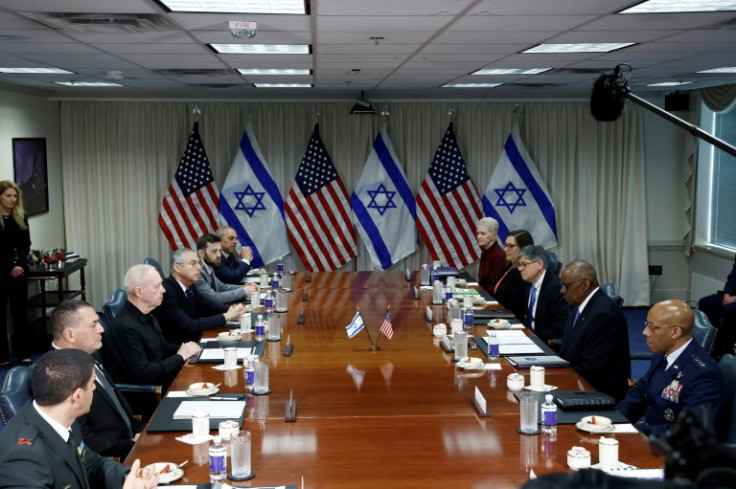US Defense Chief To Israel Counterpart: Gaza Toll 'Too High'

US Defense Secretary Lloyd Austin told his Israeli counterpart Yoav Gallant Tuesday that civilian casualties in Gaza are "too high" and suggested alternatives to a major Israeli operation in the territory's south.
A separate Israeli delegation was supposed to visit Washington to discuss US concerns over Prime Minister Benjamin Netanyahu's plans to launch an assault on the southern city of Rafah, where much of Gaza's population has sought refuge.
But Israel scrapped that visit after the United States abstained in a Monday vote on a UN Security Council resolution that called for a Gaza ceasefire, allowing it to pass.
"In Gaza today, the number of civilian casualties is far too high, and the amount of humanitarian aid is far too low," Austin said at the beginning of the meeting.
A senior Pentagon official told reporters after the meeting Austin had discussed his hopes that negotiations would "soon produce the release of all hostages."
Roughly 130 people are still believed to be held in Gaza after they were seized in the shock Hamas attack on October 7 that resulted in the deaths of about 1,160 people, mostly civilians, according to an AFP tally of Israeli figures.
Israel's retaliatory military campaign has killed at least 32,414 people in Gaza, mostly women and children, according to the health ministry in the Hamas-run territory.
The United States has backed Israel with both military and diplomatic support, but has voiced frustration with Netanyahu as the civilian death toll in the Gaza Strip mounts and the humanitarian situation worsens.
The Pentagon official told reporters Austin had acknowledged the need to dismantle Hamas's Rafah battalions but pressed the allies' "moral imperative" and "shared strategic interest" in safeguarding civilians.
"The secretary expressed our goal to help Israel find an alternative to a full-scale and perhaps premature military operation that could endanger the over one million civilians that are sheltering and Rafah," he said.
"And to do that, there's a requirement to ensure that those civilians can depart, can do so safely and can have their humanitarian needs met as they make their way to other parts of Gaza."
He said Gallant had expressed his "commitment to address those issues."
The official did not detail the alternatives to invasion suggested by Austin, but pointed to the need for increased humanitarian aid and said a maritime humanitarian corridor was expected to be up and running within weeks.
He said around 200 aid trucks were getting into Gaza each day, up from around 100 in February.
The official was asked if Austin was confident that the Rafah operation would not go forward until further discussion with the United States but declined to answer.
© Copyright AFP 2024. All rights reserved.





















